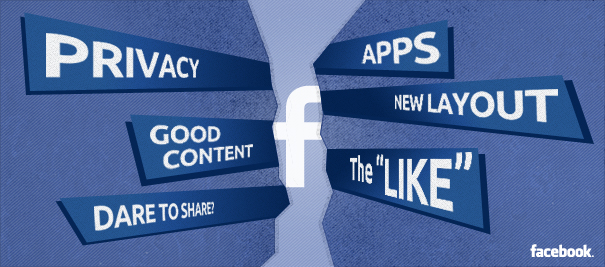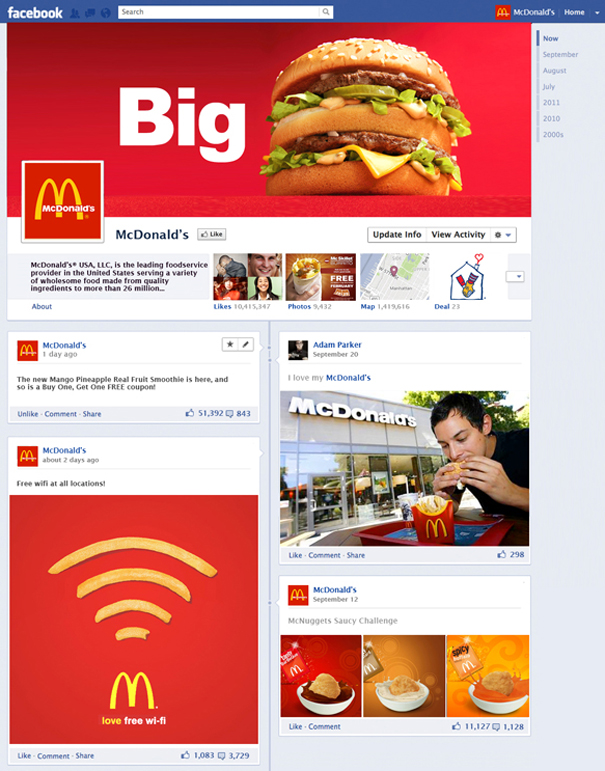
Facebook has grown to be the thousand pound gorilla in the social networking world with statistics to prove it, but even with that success they decided to make some big changes. These are the biggest changes they have made since their launch and there are big implications for businesses involved both in the short and long term.
Some claim that these new changes will transform social media forever. On the other side, PC Magazine reports that 86% of Facebook users don’t like the redesign. If Facebook’s new changes fail, it won’t be because of a lack of effort. Zuckerberg said in his keynote presentation at the F8 conference that they have been working on these new changes for the past year.
Summary of the Main Changes
There is already much discussion in the blogosphere detailing the specific features that have been changed. Below is a quick summary:
6 Takeaways: What it all Means for Your Brand
1. New Layout, New Opportunity
Zuckerberg described the advantages of the new design and layout solely from the user perspective and brushed aside any questions about how the changes would affect brand pages. From the Marketer perspective, every element that was implemented to help individuals express themselves will help brands do the same. For instance, the new large image at the top of each Timeline will speak volumes without a single word. Although brands haven’t actually implemented these changes, these mock ups show what will be possible. (Source: Skinnynyc.com)

2. The “Like” Taken Off The Pedestal
Many companies have invested in getting as many “Likes” on their pages as possible and now they are becoming less important. The original idea of the “Like” was for people to find, identify, and distribute good content. Many brands that were just trying to increase the number they had on their page and not produce quality content are going to have to change their approach or be forgotten.
3. Good Content or Die
The concept of producing quality content that people want rather than advertisements with hard sells has been around for some time, but it just got much more important. Sharing is becoming easier which means that there will be much more clutter to have to break through to be noticed and only the very best content will be able to do that. In addition, users will have much more control over their timelines by being able to select which content are the top stories. Facebook will learn over time individual preferences and automatically sort a user’s Timeline. Brands that are either boring or irrelevant won’t be selected and ranked much much lower or not at all.
4. Apps Take Center Stage
Apps are transitioning from being a tool to being a medium that people express themselves through. The emphasis has shifted from getting people to “Like” their brand to enabling the brand to become a part of the story of someone’s life. A runner may have “Liked” Nike’s brand page in the past, but now they will post that they just ran 3 miles using the Nike Plus app for all their friends to see. These apps will have a very visible presence in the Timeline. In short, there is a massive opportunity for brands to create apps that become an organic part of someone’s story.
5. Dare to Share? Automatic Sharing
Sharing aspects of your life has never been easier. Instead of deciding every time you want to share some piece of content, you can now decide to share a type of content once and then that type of content is posted automatically after that. For example, you can decide that you would like the music you listen to on the online music player, Spotify, to be posted and every song will be posted with the Spotify branded message to the Ticker automatically. Much of this will be facilitated through apps. This automatic sharing will cause there to be much more noise, but it is also an opportunity for brands. Creating an app that will enable people to share content like this will proliferate the amount of branded messages you have buzzing around on Facebook. Although we won’t know until everything has been rolled out and embraced, there will probably be far more of these automatic messages being posted than regular posts. This is one way to keep your brand in front of your customer.
6. Privacy: Facebook Knows A Lot More
Zuckerberg’s keynote announcement introduced all of these changes as benefits for the users, but they are even more beneficial for the advertisers. All of the additional user data is ideal to improve ad targeting. Some go as far as to say that the new changes were made primarily because of the advertising benefits and actually hinder the user experience while minimizing privacy.
The issue of privacy is a thorn that keeps causing problems for Facebook. It seems that privacy will become the user’s responsibility now even though Facebook’s CTO Bret Taylor said some new elements will actually give users more privacy control. Users have the opportunity to share much more content, but have to determine how much they feel comfortable sharing.
If you are a Facebook advertiser, the question you should be asking now is whether you want to adopt Facebook’s view on privacy and use all of the data they have available even if your customers may object to it.